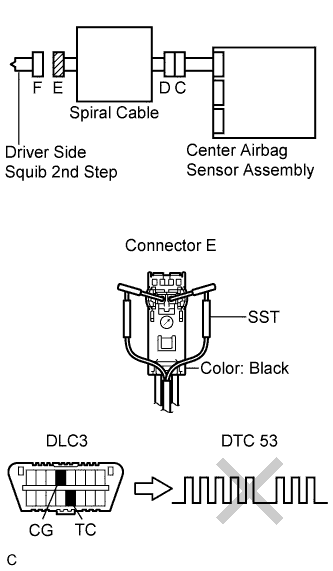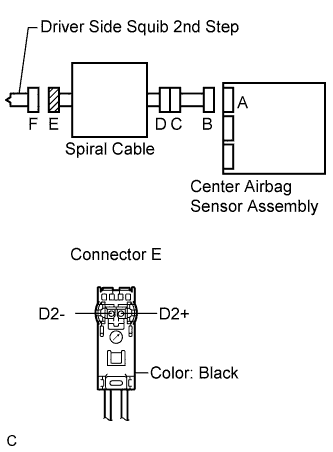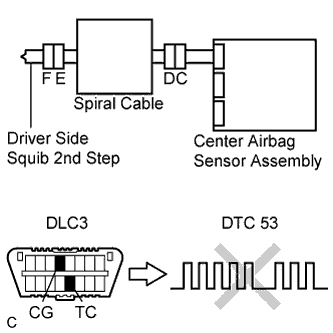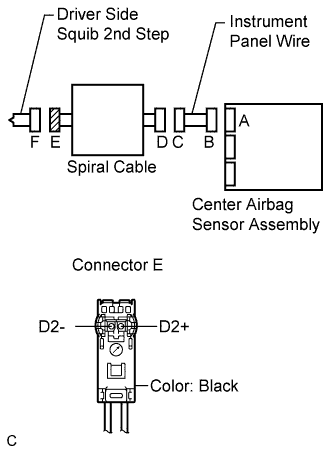CHECK STEERING PAD (DRIVER SIDE SQUIB 2ND STEP)
CHECK DRIVER SIDE SQUIB 2ND STEP CIRCUIT
CHECK CENTER AIRBAG SENSOR ASSEMBLY
DTC B1810/53 Short in Driver Side Squib 2nd Step Circuit |
DTC B1811/53 Open in Driver Side Squib 2nd Step Circuit |
DTC B1812/53 Short to GND in Driver Side Squib 2nd Step Circuit |
DTC B1813/53 Short to B+ in Driver Side Squib 2nd Step Circuit |
DESCRIPTION
The driver side squib 2nd step circuit consists of the center airbag sensor assembly, the spiral cable, and the steering pad.The circuit instructs the SRS to deploy when deployment conditions are met.
These DTCs are recorded when a malfunction is detected in the driver side squib 2nd step circuit.
| DTC No. | DTC Detecting Condition | Trouble Area |
| B1810/53 |
|
|
| B1811/53 |
|
|
| B1812/53 |
|
|
| B1813/53 |
|
|
WIRING DIAGRAM

INSPECTION PROCEDURE
- HINT:
- Perform the simulation method by selecting "check mode" (signal check) with the intelligent tester (CAMRY_ACV40 RM000000XFF00YX.html).
- After selecting "check mode" (signal check), perform the simulation method by wiggling each connector of the airbag system or driving the vehicle on a city or rough road (CAMRY_ACV40 RM000000XFF00YX.html).
| 1.CHECK STEERING PAD (DRIVER SIDE SQUIB 2ND STEP) |
Turn the ignition switch to the LOCK position.
 |
Disconnect the negative (-) terminal cable from the battery, and wait for at least 90 seconds.
Disconnect the connectors from the steering pad.
Connect the white wire side of SST (resistance 2.1 Ω) to connector E (black connector).
- CAUTION:
- Never connect the tester to the steering pad (driver side squib 2nd step) for measurement, as this may lead to a serious injury due to airbag deployment.
- NOTICE:
- Do not forcibly insert the SST into the terminals of the connector when connecting.
- Insert straight the SST into the terminals of the connector.
- SST
- 09843-18060
Connect the negative (-) terminal cable to the battery, and wait for at least 2 seconds.
Turn the ignition switch to the ON position, and wait for at least 60 seconds.
Clear the DTCs stored in the memory (CAMRY_ACV40 RM000000XFE014X.html).
Turn the ignition switch to the LOCK position.
Turn the ignition switch to the ON position, and wait for at least 60 seconds.
Check the DTCs (CAMRY_ACV40 RM000000XFE014X.html).
- OK:
- DTC B1810, B1811, B1812, B1813, or 53 is not output.
- HINT:
- Codes other than DTC B1810, B1811, B1812, B1813, and 53 may be output at this time, but they are not related to this check.
|
| ||||
| NG | |
| 2.CHECK CONNECTOR |
Turn the ignition switch to the LOCK position.
Disconnect the negative (-) terminal cable from the battery, and wait for at least 90 seconds.
Disconnect the SST from connector E.
Check that the spiral cable connectors (on the steering pad side) are not damaged.
- OK:
- The lock button is not disengaged, or the claw of the lock is not deformed or damaged.
|
| ||||
| OK | |
| 3.CHECK DRIVER SIDE SQUIB 2ND STEP CIRCUIT |
Disconnect the connectors from the center airbag sensor assembly.
 |
Check for a short to B+ in the circuit.
Connect the negative (-) terminal cable to the battery, and wait for at least 2 seconds.
Turn the ignition switch to the ON position.
Measure the voltage according to the value(s) in the table below.
- Standard voltage:
Tester Connection Condition Specified Condition D2+ - Body ground ignition switch ON Below 1 V D2- - Body ground ignition switch ON Below 1 V
Check for an open in the circuit.
Turn the ignition switch to the LOCK position.
Disconnect the negative (-) terminal cable from the battery, and wait for at least 90 seconds.
Measure the resistance according to the value(s) in the table below.
- Standard resistance:
Tester Connection Condition Specified Condition D2+ - D2- Always Below 1 Ω
Check for a short to ground in the circuit.
Measure the resistance according to the value(s) in the table below.
- Standard resistance:
Tester Connection Condition Specified Condition D2+ - Body ground Always 1 MΩ or higher D2- - Body ground Always 1 MΩ or higher
Check for a short in the circuit.
Release the activation prevention mechanism built into connector B (CAMRY_ACV40 RM000000XFD015X.html).
Measure the resistance according to the value(s) in the table below.
- Standard resistance:
Tester Connection Condition Specified Condition D2+ - D2- Always 1 MΩ or higher
|
| ||||
| OK | |
| 4.CHECK CENTER AIRBAG SENSOR ASSEMBLY |
Connect the connectors to the steering pad and the center airbag sensor assembly.
 |
Connect the negative (-) terminal cable to the battery, and wait for at least 2 seconds.
Turn the ignition switch to the ON position, and wait for at least 60 seconds.
Clear the DTCs stored in the memory (CAMRY_ACV40 RM000000XFE014X.html).
Turn the ignition switch to the LOCK position.
Turn the ignition switch to the ON position, and wait for at least 60 seconds.
Check the DTCs (CAMRY_ACV40 RM000000XFE014X.html).
- OK:
- DTC B1810, B1811, B1812, B1813, or 53 is not output.
- HINT:
- Codes other than DTC B1810, B1811, B1812, B1813, and 53 may be output at this time, but they are not related to this check.
|
| ||||
| OK | ||
| ||
| 5.CHECK INSTRUMENT PANEL WIRE |
Check for a short to B+ in the circuit.
Restore the released activation prevention mechanism of connector B to the original condition.
Disconnect the instrument panel wire connector from the spiral cable.
Connect the negative (-) terminal cable to the battery, and wait for at least 2 seconds.
Turn the ignition switch to the ON position.
Measure the voltage according to the value(s) in the table below.
- Standard voltage:
Tester Connection Condition Specified Condition E16-4 (D2+) - Body ground Ignition switch ON Below 1 V E16-3 (D2-) - Body ground Ignition switch ON Below 1 V
 |
Check for an open in the circuit.
Turn the ignition switch to the LOCK position.
Disconnect the negative (-) terminal cable from the battery, and wait for at least 90 seconds.
Measure the resistance according to the value(s) in the table below.
- Standard resistance:
Tester Connection Condition Specified Condition E16-4 (D2+) - E16-3 (D2-) Always Below 1 Ω
Check for a short to ground in the circuit.
Measure the resistance according to the value(s) in the table below.
- Standard resistance:
Tester Connection Condition Specified Condition E16-4 (D2+) - Body ground Always 1 MΩ or higher E16-3 (D2-) - Body ground Always 1 MΩ or higher
Check for a short in the circuit.
Release the activation prevention mechanism built into connector B (CAMRY_ACV40 RM000000XFD015X.html).
Measure the resistance according to the value(s) in the table below.
- Standard resistance:
Tester Connection Condition Specified Condition E16-4 (D2+) - E16-3 (D2-) Always 1 MΩ or higher
|
| ||||
| OK | |
| 6.CHECK SPIRAL CABLE |
Check for a short to B+ in the circuit.
Connect the negative (-) terminal cable to the battery, and wait for at least 2 seconds.
Turn the ignition switch to the ON position.
Measure the voltage according to the value(s) in the table below.
- Standard voltage:
Tester Connection Condition Specified Condition D2+ - Body ground Ignition switch ON Below 1 V D2- - Body ground Ignition switch ON Below 1 V
 |
Check for an open in the circuit.
Turn the ignition switch to the LOCK position.
Disconnect the negative (-) terminal cable from the battery, and wait for at least 90 seconds.
Measure the resistance according to the value(s) in the table below.
- Standard resistance:
Tester Connection Condition Specified Condition D2+ - D2- Always Below 1 Ω
Check for a short to ground in the circuit.
Measure the resistance according to the value(s) in the table below.
- Standard resistance:
Tester Connection Condition Specified Condition D2+ - Body ground Always 1 MΩ or higher D2- - Body ground Always 1 MΩ or higher
Check for a short in the circuit.
Release the activation prevention mechanism built into connector D (CAMRY_ACV40 RM000000XFD015X.html).
Measure the resistance according to the value(s) in the table below.
- Standard resistance:
Tester Connection Condition Specified Condition D2+ - D2- Always 1 MΩ or higher
|
| ||||
| OK | ||
| ||